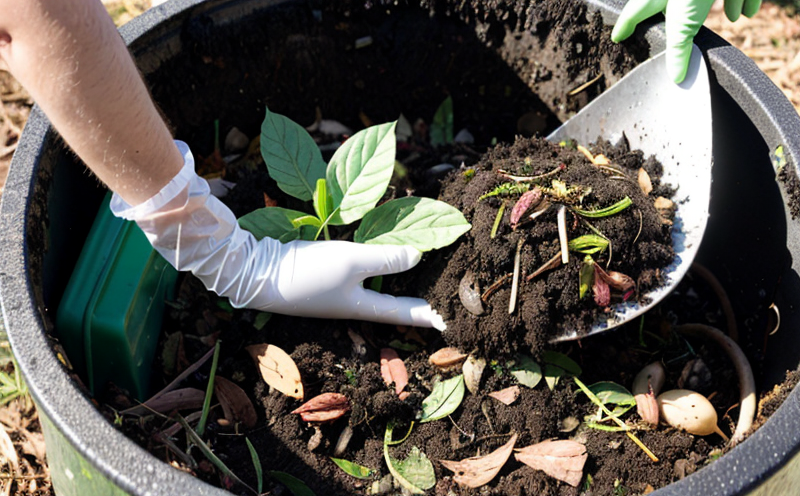Waste Management & Compost Microbial Testing
In today's increasingly environmentally conscious world, waste management and composting are critical processes that not only contribute to recycling efforts but also play a significant role in reducing landfill usage. Ensuring the quality of these materials through comprehensive microbial testing is paramount for effective waste management and successful compost production.
Microbial contamination can have severe implications on public health, soil quality, and overall ecosystem balance. Therefore, accurate and reliable microbial testing methods are essential to guarantee that waste products used in composting processes do not introduce harmful pathogens or excessive levels of undesirable microorganisms into the environment.
The process typically involves several steps, starting with sample collection from various sources within a waste management facility or directly from compost materials. Samples must be handled carefully to prevent contamination and degradation before being transported to our laboratory for analysis.
Upon arrival at our state-of-the-art facility, samples undergo rigorous preparation procedures tailored specifically for the type of material they represent—whether it's municipal solid waste, organic residuals, yard trimmings, food scraps, or any other form of biodegradable waste. This includes thorough washing and drying where necessary, followed by appropriate dilution if required.
Our laboratory employs advanced microbiological techniques such as quantitative polymerase chain reaction (qPCR), culture-based methods, molecular fingerprinting via amplification fragment length polymorphism (AFLP), next-generation sequencing technology, and more sophisticated approaches like real-time PCR to quantify specific pathogenic bacteria, viruses, fungi, protozoa, and other potential hazards present in the samples.
Once all tests are completed, we compile detailed reports outlining our findings along with recommended actions based on current international standards including ISO 17295:2013 "Microbiological quality of composting materials," EN 14048-2:2016 "Biodegradable waste—Guidelines for sampling and characterisation," and ASTM D6174-10e1 "Standard test method for determining the biodegradability of solid organic matter in a controlled composting environment."
These reports serve as valuable tools for stakeholders involved in waste management operations, helping them make informed decisions about how to handle different types of waste streams effectively. By adhering strictly to these guidelines and utilizing cutting-edge analytical techniques, we ensure that our clients receive accurate information regarding the microbial status of their materials.
Understanding the importance of proper testing cannot be overstated when dealing with such sensitive issues. Accurate data derived from thorough assessments allows facilities to maintain compliance with regulatory requirements while simultaneously enhancing overall operational efficiency and safety standards.
International Acceptance and Recognition
The global trend towards sustainable waste management practices has led to widespread acceptance of stringent microbial testing protocols across many countries. Institutions like the European Union, United States Environmental Protection Agency (EPA), World Health Organization (WHO), Food and Agriculture Organization (FAO), and others have established comprehensive frameworks aimed at ensuring hygiene standards during compost production.
Our laboratory adheres closely to these internationally recognized guidelines, providing results that are universally applicable. This commitment ensures that our clients can confidently rely on the outcomes of their tests regardless of geographical location or regulatory environment they operate within.
Competitive Advantage and Market Impact
By offering robust waste management and compost microbial testing services, we help businesses stay ahead in a competitive market by meeting stringent quality control criteria. This enables them to ensure compliance with local regulations, thereby reducing risks associated with non-compliance penalties.
The ability to provide accurate data on the microbial content of waste products fosters trust among consumers who increasingly demand transparent and responsible practices from companies handling their discarded materials. Furthermore, having reliable information about the safety profile of compost products enhances brand reputation and increases consumer confidence in purchasing these eco-friendly alternatives.
Achieving compliance with international standards also opens up new opportunities for expanding into global markets where stringent regulations apply. For instance, facilities seeking certification under schemes like PAS 100 (UK) or EN 14048 may find our testing services indispensable in attaining these certifications.
Our expertise extends beyond mere compliance; it also contributes significantly to research and development initiatives focused on improving waste management processes. By leveraging advanced technologies, we can identify emerging trends and challenges in the field, informing strategic decisions that drive innovation within the industry.
Use Cases and Application Examples
| Use Case | Description |
|---|---|
| Municipal Solid Waste (MSW) Composting | Testing for pathogens, heavy metals, and other contaminants to ensure public safety. |
| Organic Residuals from Landfills | Evaluating the microbiological quality before reintroduction into agricultural soils. |
| Yard Trimmings and Food Scraps | Determining suitability for vermicomposting or other composting methods. |
| Bioenergy Feedstocks | Analyzing microbial activity to optimize anaerobic digestion processes. |
| Use Case | Description |
|---|---|
| Agricultural Composts | Ensuring no harmful microorganisms are introduced into soil or crops. |
| Biofertilizer Production | Evaluating the microbial content to meet specific product specifications. |
| Biodegradable Plastics Degradation Studies | Monitoring the breakdown process and associated microorganisms involved. |





